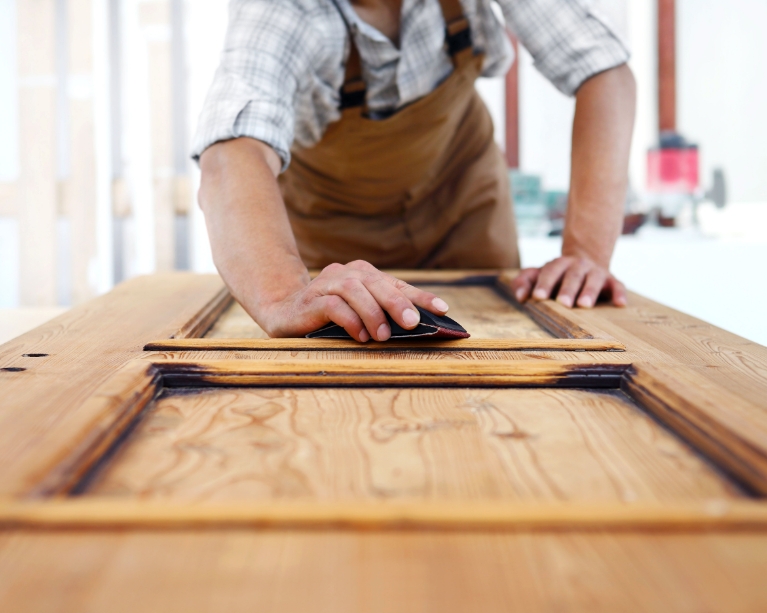

All doors, particularly those with artificial finishes, paint, or wood stains, are prone to wear and tear. We recommend that you inspect your doors on a regular basis for any paint, stain, or sealer breakdown. Paint or stain breakdown around glass openings and joints should be given special attention.
If you notice any visible wear and tear, we recommend that refinishing be performed. Natural wear and tear will usually occur after several years of continuous use, depending on the volume of usage.
We also provide refinishing and/or revarnishing services. Please contact us if you require any additional information.
Doors should never get wet – excessive exposure to moisture will warp and damage wooden doors. It is strongly advised that you avoid getting your doors soaked or wet, even after staining or sealing.
Wipe your doors down only with a damp cloth. Never use harsh chemicals or detergents on your doors.
Never hose your front door down.
When cleaning doors with stainless steel inlays/inserts, gently wipe down the surfaces with a damp cloth and thoroughly dry with a soft cloth.
Any discoloration or corrosion should be removed as soon as possible to prevent permanent staining and pitting of the paint.
Always use a high quality stainless steel cleaner to remove discoloration and always obey the manufacturer’s instructions.
All timber veneers can display significant natural variations in colour, grain patterns and textures. These variations are part of the natural beauty of timber; they are not considered defects.
A show through in door manufacturing occurs when the internal structure of the door has left a slight mark on the “skin” of the door. This occurs only on doors with a “skin thickness” of around 3mm. Normally, a display through is only visible at certain angles or by using high-gloss paints. Component show through is not considered a flaw.
Warping or bowing refers to the cupping or twisting of timber. When it comes to doors, it refers to the distortion within the door itself and not its relationship to jambs or the frame in which it is hung.
It is generally not considered a defect for a door measuring 2,150mm high to have a warp or bow up to 4mm. In addition, it is not considered a defect for doors measuring between 2,150mm and 2,400mm high to have a warp or bow up to 6mm. Doors which exceed a height of 2,438mm or a width of 1,219mm are not covered by our warranty and are not guaranteed against warping or bowing.
You can determine cupping by applying a straight edge to the concave face of the door, or twist by placing the door face against a true plane surface.
Warping or bowing can be caused by a number of factors, such as adverse moisture conditions. The usage of dark or multiple colours (paint or stain) can also cause the door to warp.
Maicador does not accept responsibility of warping or bowing when the moisture content of the timber falls below 10% or exceeds 15%.
Prompt advice should be sought if excessive warping or bowing occurs to assist in overcoming difficulty.
It is the responsibility of the home or business owner to ensure that the advice outlined here has been adhered to. Failure to follow these instructions will void the warranty.
For any enquiries or quotations, please feel free to contact us via email or call us at our phone number.
Our friendly sales representatives will be your guide for all your “Maica-door” purchases!
Contact Us
We source and import all of our wood products only from trusted partners and manufacturers. Our doors are produced locally by our very own, homebred skilled artisans — master craftsmen who spend their career specialising in woodcraft.
Our customers will always get the best that we have to offer. If a product does not meet your needs, we will replace it at no additional cost.
If you are searching for the best place to shop for doors with excellent before and after sales services, you have come to the right place.
 MAICADOR (S) TRADING PTE LTD
MAICADOR (S) TRADING PTE LTD